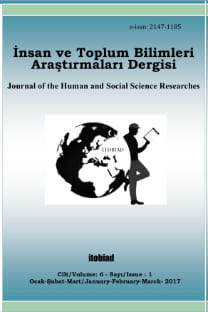Abraham Joshua Heschel Neo- Hasidik Bir Yahudi miydi?
Was Abraham Joshua Heschel A Neo-Hasidic Jew?
Heschel, neo-Hasidic, Jewish, America, Philosopher, Mistic,
___
- Bell, R. H. Jr. (Ed.) Battin, B. (Ed.) (1995). Seeds of the Spirit: Wisdom of the Twentieth Century. Louisville, Kentucky: Westminster John Knox Press.
- Besalel, Y. (2001). Yahudilik Ansiklopedisi. İstanbul: Gözlem Gazetecilik Basın ve Yayın A.Ş.
- Biale, D. (2018). INTRODUCTION: Hasidism as a Modern Movement. Hasidism: A New History. New Jersey: Princeton University Press.
- Bridger, D. (1962). The New Jewish Encyclopedia. New York: Behrman House.
- Britton, J. H. (2013). Abraham Heschel and the Phenomenon of Piety. New York: Bloomsbury.
- Cohn–Sherbok, D. (2005). Dictionary of Jewish Biography. New York: Oxford University Press.
- Cooper, D. A. (1997). God is A Verb: Kabbalah and the Practice of Mystical Judaism. New York: Riverhead Books.
- Fox, M. (1960). HESCHEL, INTUITION, AND THE HALAKHAH. Tradition: A Journal of Orthodox Jewish Thought. Rabbinical Council of America (RCA). 3/1. s.: 5-15.
- Goldberg, H. E. (1997). Becoming History: Perspectives on the Seminary Faculty at Mid-Century. Tradition Renewed: A History of the Jewish Theological Seminary of America. (Ed.) J. Wertheimer. New York: Jewish Theological Seminary of America. Vol. I. s: 353-439.
- Green, A. (2009). Abraham Joshua Heschel: Recasting Hasidism for Moderns. Modern Judaism. 29. s: 62-79.
- Green, A. (2015). The Heart of the Matter: Studies in Jewish Mysticism and Theology. Philadelphia: Jewish Publication Society.
- Green, A. - Mayse, A. E. (2019). A New Hasidism: Roots. Philadelphia: Jewish Publication Society.
- Heschel, A. J. (1996). Moral Grandeur And Spritual Audacity. (Ed.) Susannah Heschel. New York: Farrar, Straus and Giroux.
- Heschel, A. J. (1965). Who is Man?. Standford, California: Standford University Press.
- Heschel, A. J. (1955). God in Search of Man. New York: Farrar, Straus and Giroux.
- Heschel, A. J. (1954). Man's Quest for God: Studies in Prayer and Symbolism. New York: Charles Scribners Sons.
- Heschel, A. J. (1951). The Sabbath. New York: Farrar, Straus and Giroux.
- Heschel, A. J. (1950). The Earth is the Lord's: The Inner World of the Jew in Eastern Europe. New York: Henry Schuman, Inc.
- Heschel, S. (1998). Theological Affinities in the Writings of Abraham Joshua Heschel and Martin Luther King, Jr. Conservative Judaism. 50. s: 126-143.
- Horwitz, R. (1999). Abraham Joshua Heschel on Prayer and His Hasidic Sources. Modern Judaism. 19/3. Oxford University Press. s: 293-310.
- Idel, M. (2009). Abraham Joshua Heschel on Mysticism and Hasidism. Modern Judaism. 29/1. Oxford University Press. s. 80-105.
- Kaplan, E. K. (2019). Abraham Joshua Heschel: Mind, Heart, Soul. Philadelphia: University of Nebraska Press.
- Kaplan, E. K. (2007). Review of Man Is Not Alone: A Philosophy of Religion. Shofar: An Interdisciplinary Journal of Jewish Studies. 26/1. s: 190-193.
- Karesh, S. E. ve Hurvitz, M. M. (2006). Encyclopedia of Judaism. (Ed.) J. Gordon Melton, New York: Facts On File Inc.
- Magid, S. (1998). Abraham Joshua Heschel and Thomas Merton: Heretics of Modernity. Conservative Judaism. 50/2-3. s: 112-125.
- Margolis, P. (2007). Havurah. ENCYCLOPAEDIA JUDAICA (EJ). Second Edition, VIII. (Ed.) Michael Berenbaum, Fred Skolnik. Detroit: Macmillan Reference USA. s: 471-472.
- Marmur, M. (2016). Abraham Joshua Heschel and the Sources of Wonder. Toronto, Buffalo, London: University of Toronto Press.
- Marmur, M. (2007). In Search of Heschel. Shofar. 26/1. Special Issue: A Jewish Life: Abraham Joshua Heschel: A Centenary Tribute. s: 9-40.
- Nadell, P. S. ve Raphael, M. L. (1988). Conservative Judaism in America. New York: Greenwood Press.
- Reder, V. (/2007). Review of Man's Quest for God: Studies in Prayer and Symbolism by Abraham Joshua Heschel. Shofar. 26/1. Special Issue: A Jewish Life: Abraham Joshua Heschel: A Centenary Tribute. s: 193-195.
- Rothschild, F. A. ve Meir, E. (2007). HESCHEL, ABRAHAM JOSHUA. ENCYCLOPAEDIA JUDAICA (EJ), Second Edition. IX. (Ed.) Michael Berenbaum, Fred Skolnik, Detroit: Macmillan Reference USA. s: 70-72.
- Shook, J. R. ve Richard T. H. (2005). Heschel. The Dictionary of Modern American Philosophers. Bristol: Thoemmes Continuum. s. 1101-1104.
- Wertheimer, J. (1997). JTS and the Conservative Movement. Tradition Renewed: A History of The Jewish Theological Seminary of America. II. (Ed.) Jack Wertheimer. New York: The Jewish Theological Seminary of America. s: 405-442.
- Wigoder, G. (1992). The New Standard Jewish Encyclopedia. New York: Facts On File. Inc.
- Wigoder, G. (1989). The Encyclopedia of Judaism. New York: Macmillan Publishing Company.
- Web Siteleri https://www.encyclopedia.com/religion/encyclopedias-almanacs-transcripts-and-maps/dresner-samuel-hayim erişim: 23.04.2020
- https://www.yivo.org/About-YIVO erişim: 23.04.2020
- https://www.learnreligions.com/what-is-universalism-700701 erişim: 23.04.2020
- https://www.jewishvirtuallibrary.org/hasidim-and-mitnagdim erişim: 23.04.2020
- https://happyminyan.org/rabbi-shlomo-carlebach/ erişim: 23.04.2020
- https://www.colorado.edu/post-holocaustamericanjudaismcollections/home/biography-zalman-schachter-shalomi erişim: 23.04.2020
- https://peoplepill.com/people/arthur-green-6/ erişim: 23.04.2020
- http://jbuff.com/c121301.htm erişim: 24.04.2020
- https://www.chabad.org/library/article_cdo/aid/111855/jewish/Don-Isaac-Abravanel-The-Abarbanel.htm erişim: 25.04.2020
- ISSN: 2147-1185
- Yayın Aralığı: 4
- Başlangıç: 2012
- Yayıncı: Mustafa SÜLEYMAN ÖZCAN
Bilişimsel Düşünme Becerileri Ölçeğinin Geliştirilmesi: Geçerlik ve Güvenirlik Çalışması
Kant'ta Sentetik Apriori Sorunu
Okul Müdürlerinin Öğretim Liderliği Davranışlarının İncelenmesi
Psikolojik Rahatlığın Bilgi Paylaşımı, Çalışmaya Tutkunluk ve Çalışan Performansı Üzerine Etkisi
Bahar GENÇEL, TAHSİN AKÇAKANAT, Mehmet DİNÇ
Baltık Kuru Yük Endeksi e Dow Jones Demir- Çelik Endeksi Arasındaki İlişki
Abdulkadir BARUT, Mehmet Ragıp GÖRGÜN, Aylin ERDOĞDU
Baltık Kuru Yük Endeksi ve Dow Jones Demir- Çelik Endeksi Arasındaki İlişki
Abdulkadir BARUT, Mehmet Ragıp GÖRGÜN, Ayla KORKMAZ
Makroekonomik Performans Göstergelerinin Yolsuzluğa Etkisi
Rabia EFEOĞLU, Sabri AZGÜN, Ömer Selçuk EMSEN
Enflasyonun Borsa Endekslerı Üzerindeki Etkileri: BİST 100 Endeksinden kanıt
